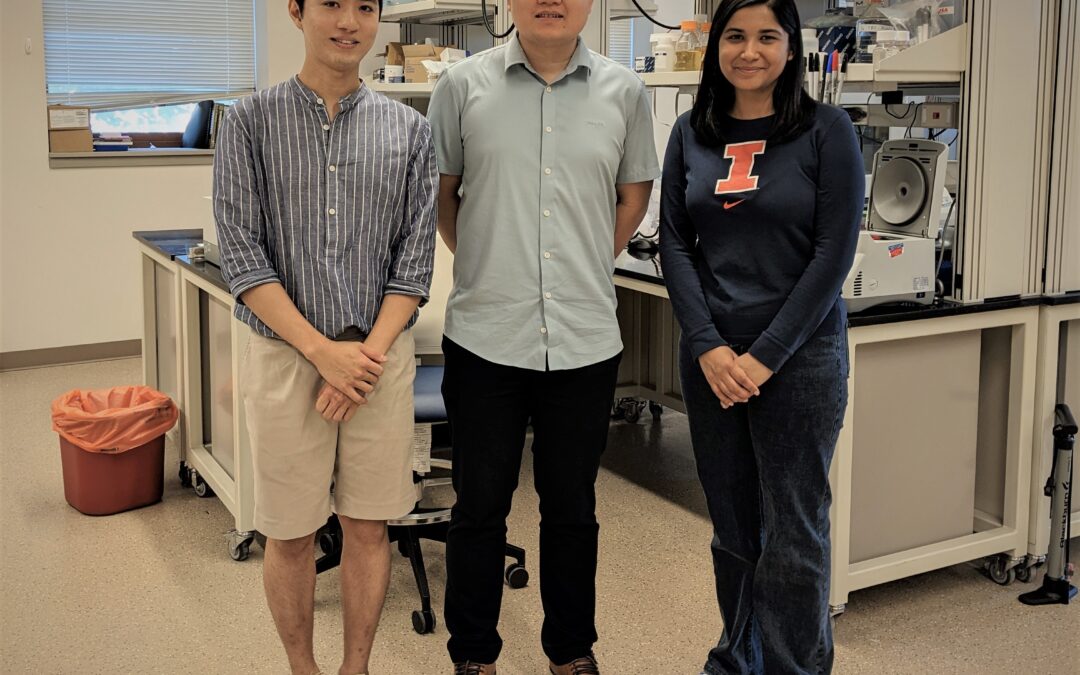Cancer Center at Illinois members Joonsu Han (left), Hua Wang (center), and Rhimsha Bhatta.
Researchers in Cancer Center at Illinois (CCIL) member Hua Wang’s lab continue to pioneer novel technologies that enhance the efficacy of cancer immunotherapies. The latest innovation, detailed in a newly published paper in Cellular & Molecular Bioengineering, describes a novel biomaterial for cancer vaccines.
Therapeutic cancer vaccines – a form of cancer immunotherapy – function by modulating antigen-presenting cells with tumor-specific antigens to initiate an immune response against cancer. While this treatment is relatively safe compared to other immunotherapies, current vaccines show modest efficacy. To remedy this inadequacy, the Wang lab developed a bio-adhesive microporous hydrogel loaded with tumor extracellular vesicles (EVs) – tiny lipid packages released from tumor cells – and granulocyte-macrophage colony stimulated factor (GM-CSF) – chemical-signaling proteins that attract specific immune cells. The biomaterial is implanted under the skin and can remain there, recruiting and training immune cells to assault cancer cells.
The CCIL research team, led by Joonsu Han and Rimsha Bhatta, found that the presence of EVs and GM-CSF indeed allowed the recruitment of immune cells, including dendritic cells, which were able to process and present the cancer-specific antigens from the EVs. The team demonstrated this successful recruitment and modulation of dendritic cells in an in vivo mouse model.
The CCIL’s interdisciplinary collaboration enables innovative approaches to the challenges presented by cancer, as noted by Wang: “We have team members from the fields of molecular biology, materials science, mechanical engineering, and more, working together at the interface of immunotherapy, cellular engineering, and chemistry. We are also partnering with many other CCIL members. This project integrates two research pathways in my laboratory: exosome-based immunotherapy and immune cell homing biomaterials.”
PhD student Joonsu Han formerly worked in industry in polymer science. Han brought his hydrogel expertise to Wang’s lab, helping develop this novel bioadhesive microporous hydrogel for cancer immunotherapy. “While there are numerous biomaterials-based cancer vaccines, our bio-adhesive hydrogel-based approach is relatively unexplored. That is one of the innovative features of our project,” said Han. “We show that the bioadhesive microporous hydrogel equipped with chemokines and EVs can generate a persistent anti-tumor T cell response.”
Rimsha Bhatta, a PhD student in materials science and engineering, brought her expertise in EVs to the team’s project. “EVs are a unique type of nanoparticles that contain many molecules including antigens from the parent cell and they are very good at delivering the antigens to dendritic cells, which then helps catalyze the dendritic cells’ activation and presentation. This activity is significant since dendritic cells are one of the most important types of immune cells in the body to elicit antitumor immune responses for killing off tumor cells. We thought we might combine the EVs with a microporous dendritic cell homing hydrogel – a safe, easy-to-apply patch – to determine if it can enhance the vaccine’s effectiveness,” said Bhatta.
The team envisions this technology in future applications, including drug delivery, tissue regeneration, and long-term immunosuppression for cancer and other diseases.
Editor’s notes:
Hua Wang is a Cancer Center at Illinois (CCIL) member, a professor of materials science and engineering, and is affiliated with the Departments of Materials Science and Engineering, Bioengineering, the Beckman Institute, Materials Research Laboratory, and the Carl R. Woese Institute for Genomic Biology.
To contact Hua Wang, email huawang3@illinois.edu.
This research was supported by NSF DMR 2143673 CAR, NSF GCR 2121003, R01CA274738, NIH R21CA270872, the Department of Materials Science and Engineering at the University of Illinois Urbana-Champaign, and the Cancer Center at Illinois. Han J. acknowledges the support from the Cancer Scholars for Translational and Applied Research (C*STAR) Program (CST EP082021). Bhatta R. acknowledges the support from the National Institute of Biomedical Imaging and Bioengineering of the National Institutes of Health (T32EB019944).
The paper “Bio-adhesive Macroporous Hydrogels for In Situ Recruitment and Modulation of Dendritic Cells” is available online. https://doi.org/10.1007/s12195-023-00770-2.
Written by Katie Brady and Jonathan King, CCIL Communications Team

